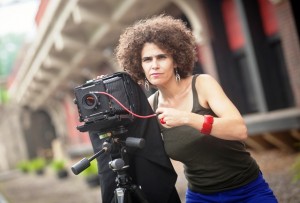Art professor Karina Skvirsky will teach and create a film in Ecuador placing her great-grandmother in a historical narrative.

Professor Karina Skvirsky
In 1906, Karina Skvirsky’s great-grandmother, Maria Palacios, traveled from Choata, in Ecuador’s highlands, to coastal Guayaquil to work as a domestic for a wealthy family.
Two years later, a North American engineering team finished a national railway along roughly the same route she had taken by mule.
Skvirsky, assistant professor of art, plans to reconstruct Palacios’s journey and tell her story in a way that combines fact and fiction.
She has received a Fulbright Fellowship as part of her 2014-15 sabbatical. She will spend the spring semester doing field research, scouting locations, and producing a 16 mm film that uses fictional reenactments and documentary practices, casting herself as Palacios.
The project, “La ruta del oro” (The Route to Gold), will explore global economics and tourism through the lens of individual experience.
Skvirsky also will teach in Ecuador as part of the fellowship.

Professor Karina Skvirsky
“I love the idea of placing my great-grandmother in an important historical narrative that casts her as someone controlling her destiny. It’s a revisionist history; one that is not didactic but ‘ethnographic’ and playful at the same time,” Skvirsky says.
The project will also include a series of photographic collages, “Best Practices for Constructing a Railroad in the Andean Mountains,” for which Skvirsky drew on the National Ecuadorian Bank’s historical archive documenting the complex construction of the Quito-Guayaquil railway. These collages made from black and white photos, engineering plans, diary entries, and newspaper scraps re-create the official archive as a scrapbook that could have been made by Palacios herself.
“These two stories are micro-histories that examine place and the nature of the archival document. When juxtaposed, Palacio’s personal, private female journey newly inflects the national, public male history of the railway—in effect, re-signifying Ecuadorian modernity,” Skvirsky says.

